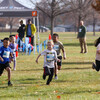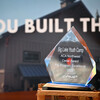Protect Yourself from Mosquito Bites
Mosquitoes may cause more than just an itchy bump. Certain mosquitoes can carry viruses, such as West Nile. Most people who are bitten will not get sick, but some will develop symptoms such as fever, headache and body aches. Occasionally, someone who is infected may also be sensitive to light and have pain behind the eyes. The good news is that most people who develop symptoms will recover. Avoiding mosquitoes doesn't mean you have to stay inside. Read how to protect yourself at www.wellsource.org/handouts/mosquito.pdf.
Beat the Heat
Temperatures that hover 10 degrees or more above the average high temperature for the region and last for several weeks are defined as extreme heat. When temperatures are extremely high, take steps to protect yourself and loved ones:
1. Drink more fluids, regardless of your activity level.
2. Stay indoors during the hottest part of the day. If possible, stay in an air-conditioned place. If you do not have air conditioning, visit a shopping mall or public library for a few hours, or call your local health department to find heat-relief shelters in the area.
3. Wear lightweight, light-colored, loose-fitting clothes.
4. Never leave people or pets in a closed, parked vehicle.
5. Plan to visit adults or children who are at risk daily and closely watch them for signs of heat exhaustion or heat stroke.
Read more at: www.bt.cdc.gov/disasters/extremeheat/.
Keep Your Food Safe
A family of four on a moderate-cost shopping plan spends, on average, more than $225 each week for groceries, according to the U.S. Department of Agriculture. The rising cost of food has Americans gardening, eating more home-cooked meals, and reheating leftovers. Too frequently, fresh food spoils before you can eat it. To help keep food fresh, follow these basics:
1. Choose the freshest produce.
2. Buy perishables (e.g., bread) close to when you plan to use it.
3. Prepare and store food properly.
Read more at: www.wellsource.org/handouts/Food_Safety.pdf.
Help Prevent Skin Cancer
Skin cancer is the most commonly occurring cancer in the United States. Ultraviolet rays can reflect off virtually any surface, including sand, water, concrete, snow and ice. They can also penetrate light clothing, windshields, windows and clouds. To be safe in the sun, consider these tips:
1. Stay out of midday sun.
2. Wear a wide-brimmed canvas hat to protect your ears and neck.
3. Wear loose-fitting, long-sleeved shirts and long pants.
4. Wear sunglasses that provide 100 percent UV protection for your eyes.
5. Whenever you're outside, wear a broad-spectrum UV lip balm and sunscreen with at least SPF 15 that blocks both UVA and UVB rays. Apply it 30 minutes prior to sun exposure, and reapply it every two to three hours when in the sun.
6. Seek shade whenever possible—before you need relief from the sun.
7. Stay away from tanning beds and sunlamps.
Ask the Wellness Doctor
Q: Some of my medications cause me to have severe constipation. I've tried fiber, stool softeners and laxatives, but they don't seem to help. And laxatives cause cramping. Can you suggest an alternative?
A: Constipation is a common side effect from medications. Read the entire answer from Dr. Don Hall at www.wellsource.org/ask/constipation.pdf.




